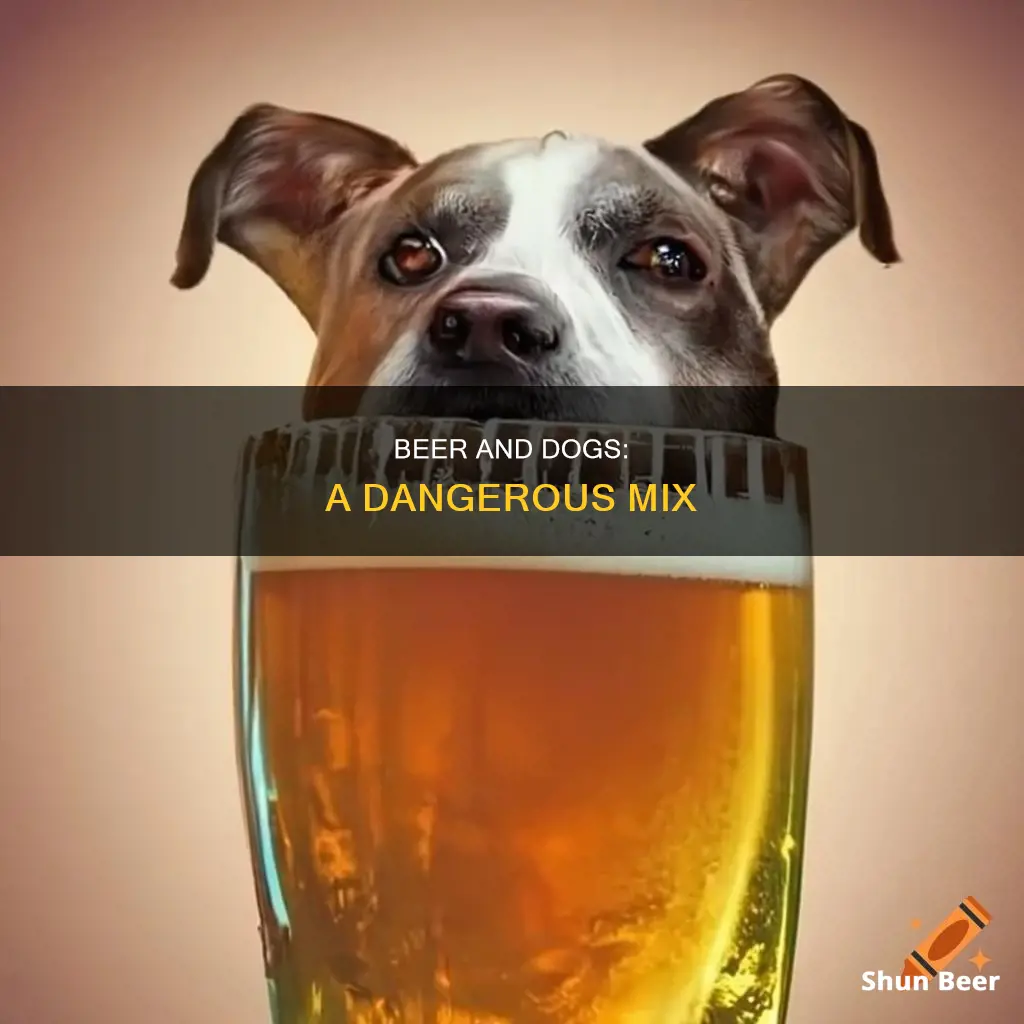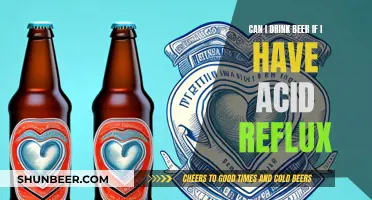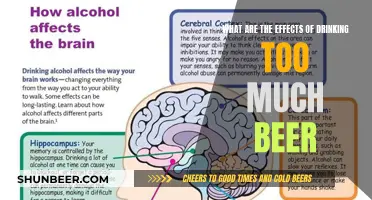
Dogs should never drink beer, as even a small amount of alcohol can be toxic and quickly lead to alcohol poisoning. If a dog consumes beer, they may experience symptoms such as vomiting, disorientation, lack of coordination, muscle tremors, seizures, lethargy, low blood sugar, and low body temperature. In severe cases, alcohol poisoning can lead to organ failure and even death. Therefore, it is essential to keep alcoholic beverages out of a dog's reach and never intentionally give them beer or any other type of alcohol.
| Characteristics | Values |
|---|---|
| Amount of alcohol needed for intoxication | It depends on the dog's weight and health. Toy breeds are more susceptible to alcohol poisoning. |
| Ethanol concentration | The published oral lethal dose in dogs is 5.5 to 7.9 g/kg of 100% ethanol. |
| Attractiveness to dogs | Dogs may be attracted to fruit-based drinks, cocktails, punches, ciders, and seltzers. |
| Symptoms of alcohol poisoning | Depression or lethargy, lack of coordination, vomiting or retching, decreased respiratory rate, hypoglycemia, hypotension, hypothermia, muscle tremors, seizures, disorientation, high body temperature, organ failure, coma, and death. |
| Treatment | Contact a vet, an emergency clinic, or the Pet Poison Helpline. Induce vomiting if instructed to do so by a vet. |
What You'll Learn

Beer is toxic to dogs, even in small amounts
During the fermentation process to form beer, ethanol, or grain alcohol, is produced. It takes very little alcohol in animals for poisoning to develop—only a few licks in small dogs are often enough for them to appear drunk. And a dog that seems drunk has likely been poisoned.
If your dog appears drunk after drinking beer or other alcohol, you need to head to the veterinarian right away. Only induce vomiting at home if a veterinarian instructs you to do so. These drunk-looking dogs typically always require a veterinary visit because of the significant signs that can develop, which are often life-threatening. They should never be allowed to 'sleep it off'.
At the veterinary hospital, a veterinarian can help hydrate your dog, regulate your dog's blood sugar levels and body temperature, and provide supportive care.
If your dog licks or drinks any alcohol, or you suspect they might have, contact your vet straight away. Never try to treat alcohol poisoning at home. If it's been less than 15 minutes since ingestion, a vet may induce vomiting to help remove the alcohol from your dog's digestive system.
Cutting Weight and Drinking Beer: Is It Possible?
You may want to see also

Dogs can quickly develop alcohol poisoning from beer
Dogs are highly sensitive to the effects of alcohol, and it is absorbed faster and spreads quicker through their bloodstream. Even a few licks of beer for a small dog are often enough for them to appear drunk, and a dog that seems drunk has likely been poisoned. Signs of alcohol poisoning include vomiting, disorientation and lack of coordination, lethargy, decreased breathing rate, low body temperature, low blood sugar, and seizures. If your dog is staggering or disoriented, go straight to the emergency vet.
If your dog has drunk beer, you should contact your vet right away. If it has been less than 15 minutes since ingestion, a vet may be able to induce vomiting to help remove the alcohol from your dog's digestive system. If it has been longer, vets will determine if the amount ingested is toxic and choose supportive care.
Beer should be kept out of a dog's reach, and dogs should be kept away from unattended alcoholic drinks.
Beer and Lorazepam: Safe Mix or Risky Cocktail?
You may want to see also

Signs of alcohol poisoning include vomiting, lethargy, and seizures
Dogs should never drink beer. Even a small amount of beer can cause alcohol poisoning in dogs, which can be life-threatening.
Vomiting is one of the first signs of alcohol poisoning in dogs. If your dog vomits once and shows no other symptoms, they may recover without further issues. However, if your dog vomits multiple times or exhibits additional symptoms, a visit to the emergency veterinarian is necessary.
Lethargy and disorientation are also common signs of alcohol poisoning in dogs. Your dog may seem confused, restless, and have difficulty walking or standing. They may appear wobbly and experience a loss of coordination. These signs indicate that the poisoning is worsening, and emergency veterinary care is required.
In severe cases of alcohol poisoning, dogs may suffer from seizures and muscle tremors. If your dog exhibits these symptoms, it is a sign of severe intoxication, and they need immediate veterinary care. Left untreated, severe alcohol poisoning can lead to a coma or even death.
It is crucial to act quickly and seek veterinary help if you suspect your dog has consumed beer or is displaying any signs of alcohol poisoning.
Beer Drinking on New Jersey Transit: What's Allowed?
You may want to see also

Alcohol can cause long-term health issues and changes to a dog's brain
Alcohol can have serious and long-lasting effects on a dog's health and brain. Research has shown that alcohol can cause changes to the structure of a dog's brain and lead to cardiovascular concerns. In severe cases, alcohol consumption can even be fatal for dogs.
Dogs are highly sensitive to the effects of alcohol, and it is absorbed much faster into their bloodstream compared to humans. Even a small amount of alcohol can lead to symptoms of intoxication, including mild staggering, incoordination, and difficulty breathing. The amount of alcohol ingested and the weight of the dog will determine how quickly they become intoxicated.
If a dog consumes alcohol, they can quickly develop alcohol poisoning. Signs of alcohol poisoning include vomiting, disorientation, lack of coordination, muscle tremors, and seizures. In some cases, alcohol poisoning can lead to life-threatening complications, such as low blood sugar, low blood pressure, and hypothermia.
It is important to seek immediate veterinary assistance if your dog has ingested any alcohol. If it has been less than 15 minutes since ingestion, a vet may induce vomiting to help remove the alcohol from the dog's digestive system. If it has been longer, vets will determine if the amount ingested is toxic and provide supportive care.
To prevent your dog from consuming alcohol, it is important to keep all forms of alcohol stored out of their reach and never leave alcoholic drinks unattended.
Beer Expiry: Safe to Drink After Two Years?
You may want to see also

If a dog drinks beer, contact a vet immediately
If a dog drinks beer, it is important to contact a vet immediately. Beer is toxic to dogs and can quickly lead to alcohol poisoning, even in small amounts. Dogs are highly sensitive to the effects of alcohol, and it doesn't take much for poisoning to develop. The amount of alcohol and the size of the dog will determine how fast they get alcohol poisoning.
Signs of alcohol poisoning in dogs include vomiting, disorientation, lack of coordination, lethargy, decreased respiratory rate, low blood sugar, low blood pressure, low body temperature, muscle tremors, and seizures. If your dog is showing any of these symptoms, it is important to seek veterinary help right away.
At the veterinary hospital, a veterinarian can help hydrate your dog, regulate their blood sugar levels and body temperature, and provide supportive care. It is important to note that dogs should never be allowed to "sleep it off" and that alcohol intoxication in dogs can be life-threatening.
To prevent your dog from drinking beer or other alcoholic beverages, it is recommended to keep them away from unattended drinks and to store alcohol out of their reach. Additionally, it is important to communicate with your guests about not giving your dog any alcoholic drinks. Taking these precautions can help keep your dog safe and healthy.
Beer and Breastfeeding: Is It Safe to Mix?
You may want to see also
Frequently asked questions
Yes, beer is toxic to dogs. Even a small amount can be harmful.
Dogs may be attracted to beer because of its sweet taste or its smell. They may also want to drink beer because their owners are drinking it.
Symptoms of alcohol poisoning in dogs include vomiting, disorientation, lack of coordination, tremors, seizures, lethargy, decreased respiratory rate, low blood sugar, low blood pressure, and low body temperature.
If your dog drinks beer, you should contact your vet immediately and follow their advice. They may recommend taking your dog in for a check-up or suggest waiting to see if your dog has a reaction. If your dog is staggering or disoriented, go to the emergency vet right away.
To prevent your dog from drinking beer, keep it stored away and out of reach. Don't leave alcoholic drinks unattended, and put them in a glass with a lid if necessary. If you have guests over, make sure they know not to give your dog alcohol and consider putting your dog in another room.







